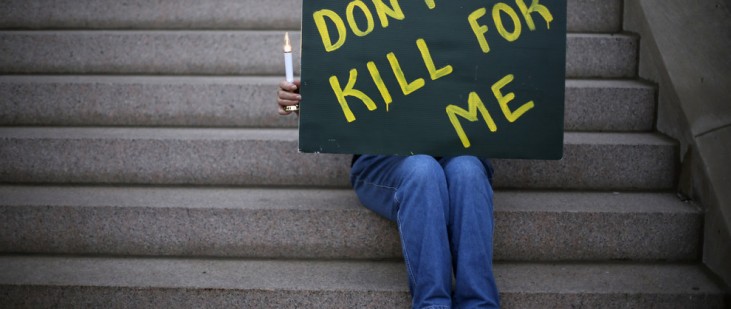By Chris Geidner | BuzzFeed News | November 8, 2015
Henderson Hill and Rob Smith are the odd couple shepherding a collaborative effort to end the death penalty in America at the most significant moment for that movement in decades.
As talk of mass incarceration, racial disparities, and criminal justice legislation has permeated the public debate on both sides of the political spectrum, another effort has taken shape under the radar: the laying of the groundwork for a Supreme Court ruling that the death penalty is unconstitutional, a violation of the Eighth Amendment’s ban on cruel and unusual punishments.
When Supreme Court Justice Stephen Breyer, along with Justice Ruth Bader Ginsburg, raised the prospect this June of the Supreme Court revisiting the constitutionality of the death penalty — using a key part of Smith’s work as evidence — the ground shifted overnight, and discussions went from hypothetical to hyperdrive.
In the wake of that change, two of the death penalty’s most strident abolitionists sat down with BuzzFeed News to make their case not only for ending the death penalty in the United States — but for doing so in the next few years. The effort, as with so many focused on the Supreme Court, ultimately comes down to Justice Anthony Kennedy.
The 8th Amendment Project, which Hill and Smith run, is a centralized effort to advance death penalty abolition research, raise issues of legal system accountability, and help capital defense efforts — all with the Supreme Court in mind. It has a $1 million budget and six full-time staff members this year. It is part of a national effort backed by the Themis Fund, a donor collaborative dedicated to ending the death penalty in America, the fund’s director told BuzzFeed News. The Themis Fund was launched as an initiative of the progressive Proteus Fund in 2007, when a broad array of opponents of capital punishment — from litigators to funders — came together to figure out a way to end capital punishment in the country.
As death sentences and executions slowed down across the country — and some states got rid of it altogether — the Themis Fund donors decided to ramp up their efforts. In 2014, Hill, a 59-year-old black lawyer who began his career decades ago as a public defender, was made the head of the project, giving it its current name. He has since brought on Smith, a 34-year-old white law professor who graduated from law school in 2007, to serve as the project’s litigation director.
Hill first started defending prisoners on death row back in the 1990s. Smith left his job as a tenure-track professor at the University of North Carolina Chapel Hill School of Law to join the project.
The first goal of the 8th Amendment Project is to solidify the foundation for a Supreme Court challenge to the constitutionality of the death penalty. It will do so, Hill explained, by focusing on providing evidence relating to three main areas: The death penalty is being imposed and implemented less and less often; the few counties that do so highlight fundamental problems with system itself; and the people who end up on death row are not “the worst of the worst” but are, instead, “the weakest of the weak.”
The 8th Amendment Project’s “ultimate mission,” though, is to support lawyers who actually bring cases to the Supreme Court that are aimed at ending the death penalty. This second goal, moreover, is already underway. The project is providing support in potential cases out of Louisiana and Texas, BuzzFeed News has learned.
As Hill put it, “That’s who we are: We illuminate what the death penalty looks like when you look at the system up close, and we provide support to our partners and friends who seek to end the death penalty through a victory at the Supreme Court.”
Hill and Smith come at the issue from different worlds — and with subtly different aims — but their visions come together at the singular goal of getting a Supreme Court decision, within the next few years, that ends the death penalty.
“I think there’s a lot of optimism and confidence that the court’s close to declaring the death penalty unconstitutional,” Hill said. “And, I think that excitement helps to generate support for a project to coordinate efforts and to support efforts that are strategic and might help things along.”
Hill doesn’t take credit for getting the movement where it is — or even for what is happening now.
“It’s a diverse community, of dozens and dozens of organizations, that have been around and in the fight for 30 years that the attention is appropriately focused on,” he said. “I’m not representing a single client — and that’s the first time I’ve been able to say that in 35 years,” adding that he credits today’s focus on race and the criminal justice system to the lawyers on the ground, people working in state legislatures, and researchers who have been doing the work.
Talking at length, though, with Hill and Smith provides a good picture of an aggressive arm of the abolition movement that sees the potential to end to the death penalty in America in the near future. After toiling for decades, this group believes, the effort is reaching its moment of truth.
As David Menschel, a prominent funder of and lawyer within the movement, said, “It’s time for the movement to be thinking about how it might bring a case to the Supreme Court — to hear what Breyer was saying.”
This is the story of how the death penalty abolition movement got here, and how — from Hill and Smith’s vantage point — they plan to win.



